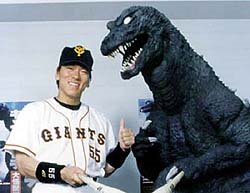Undoubtedly the most successful Japanese player to make the transition to the MLB Ichrio sparked a period of high spending on international free agents. One player that often gets overlooked as a great success is Hideki Matsui.
 |
| Hideki Matsui |
Following his 3 year contract Matsui signed a 4 year $52 Million deal yielding an average annual value of $13 Million which is the modern day equivalent of a 4 year $66 Million contract. Over this span Matsui only played an average of 107 games with an average annual WAR of 2.2. He did not do as well in his last 4 years with the Yankees as he did in his first 3, but considering the value that international free agents are signing for today, the Matsui deal was a steal for the Yankees.
Yoenis Cespedes signed a 4 year $36 Million deal with the Oakland Athletics in 2012. Due to the slight change in CPI from 2012 to 2015 the nominal and real dollars of the deal are close to equal. The average annual value of the first 3 years of the Cespedes deal was $8.5 Million and his average annual WAR for those 3 years was 3.2, just less than Matsui, but at a similar average annual value.
Another international free agent who signed in 2012 was Yu Darvish who signed a 6 year $56 Million deal with the Texas Rangers, but over the first 3 years of the deal Darvish was paid $25 Million which yields an average annual value of $8.33 Million, but his average annual WAR was greater than both Cespedes and Matsui at 4.3 per season.
In 2014 international free agents began signing for much more. Part of this is due to a change in the posting system in Japan. Instead of the teams competing to post the highest bid to negotiate with a player, they can now post a max bid of $20 Million and all teams that posted the bid can negotiate with the player.
| Masahiro Tanaka |
Also in 2014 Rusney Castillo a Cuban prospect signed a 7 year $72.5 Million with the Boston Red Sox. Castillo only played 10 games in 2014, but his average annual value is much higher than most other international prospects. The interesting part of the contract is the length. Castillo is only 27 years old and the Red Sox made a 7 year commitment just like the Yankees did with Tanaka, before either of them played a single game in the Major League.
Jose Abreu signed a 6 year $66.3 Million deal with the Chicago White Sox in 2014 and was paid $7 Million in 2014. His WAR for the 2014 season was 5.5 as he hit himself to a Rookie of the Year Award in an MVP caliber season. He had never played a game in the Major League prior to signing the contract, but the White Sox definitely got their bargain.
| Yoan Moncada |
Yoan Moncada is just 19 years old and he signed with the Red Sox with a signing bonus of $31.5 Million. The International free agent market is getting more competitive with more money being invested, players are signing at a younger age, and longer commitments being made to the players. The days were a team can sign an international free agent like Hideki Matsui for a contract similar to his initial 3 years $21 Million contract are gone. The risk involved in signing international free agents is higher than ever.
No comments:
Post a Comment